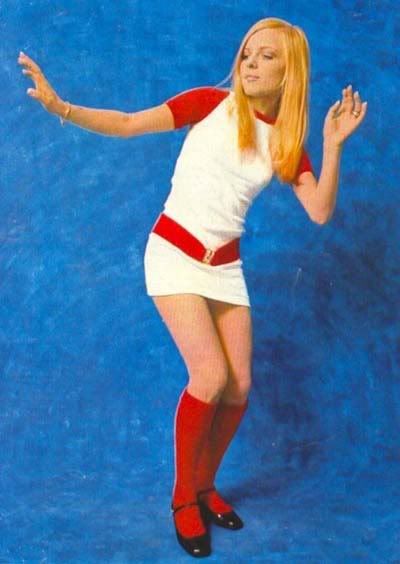 I decided to create a blog about the popular European Genre of music known as Yé-yé. Mainly because of it's ever growing obscurity as time has moved forward. A large majority of people have never even heard of the genre nonetheless listened to it. Especially in the United States. Yé-yé music has had a very influential part in the history of what popular music is today and what it will some day evolve into eventually. Also Yé-yé has not only been influential in the evolution of popular music but also has had just as much, if not more, influence on music that has strayed away from the mainstream.
I decided to create a blog about the popular European Genre of music known as Yé-yé. Mainly because of it's ever growing obscurity as time has moved forward. A large majority of people have never even heard of the genre nonetheless listened to it. Especially in the United States. Yé-yé music has had a very influential part in the history of what popular music is today and what it will some day evolve into eventually. Also Yé-yé has not only been influential in the evolution of popular music but also has had just as much, if not more, influence on music that has strayed away from the mainstream.
 Yé-yé was a popular style of pop music that had emerged from France, Québec and Spain in the early 1960s. The term "yé-yé" derived from teenagers shouting "yeah! yeah!" at concert venues and while listening to the music genre to show enthusiasm. Yé-yé music was unique in a number of ways: first, it was the only musical movement so far to be spearheaded by females; second, it was a mostly European phenomenon, although it grew very popular in Japan in 1965. Yé-yé girls were always young (age 15 through 17 usually) and maintained an innocent public image which was perpetuated through the music.
Yé-yé was a popular style of pop music that had emerged from France, Québec and Spain in the early 1960s. The term "yé-yé" derived from teenagers shouting "yeah! yeah!" at concert venues and while listening to the music genre to show enthusiasm. Yé-yé music was unique in a number of ways: first, it was the only musical movement so far to be spearheaded by females; second, it was a mostly European phenomenon, although it grew very popular in Japan in 1965. Yé-yé girls were always young (age 15 through 17 usually) and maintained an innocent public image which was perpetuated through the music.
Yé-yé girls were also sexy, in a deliberately naive way. Often Yé-yé lyrics and music were written by older male songwriters and sometimes would contain sexually suggestive themes and lyrics hidden in metaphors that were meant to sound innocent. A good example of this is featured in a song preformed by France Gall and written my famous Yé-yé singer/ songwriter Serge Gainsbourg called "Les sucettes" ("Lollipops") which include the lyrics "Annie loves lollipops, aniseed lollipops, when the sweet liquid runs down Annie's throat, she is in paradise." Due to France Gall's naivety as a young women she preformed the song never recognizing the hidden reference to fellatio until becoming a little older.
 While the yé-yé movement was led by female singers, it was not an exclusively a movement for young women. The yé-yé masterminds (such as Serge Gainsbourg, who wrote several hits for France Gall, Petula Clark, and Brigitte Bardot, but was considerably older and came from a jazz background) were distinct from the actual yé-yé singers. These were harmless, romantic boys singing mostly ballads and love songs.
While the yé-yé movement was led by female singers, it was not an exclusively a movement for young women. The yé-yé masterminds (such as Serge Gainsbourg, who wrote several hits for France Gall, Petula Clark, and Brigitte Bardot, but was considerably older and came from a jazz background) were distinct from the actual yé-yé singers. These were harmless, romantic boys singing mostly ballads and love songs.
In this blog I will also touch on more topics than just Yé-yé artists and music exclusively. I will also write about some of the influences the music and culture has had on art, fashion and what the genre has contributed to music that would come to proceed Yé-yé. If you are interested please follow my blog and participate by adding comments and I will do my best to post music and related topics almost everyday.




Showing my support!
ReplyDeletefollowing
ReplyDeleteThese get more interesting by the day!
ReplyDeleteNice!
ReplyDeleteSupportin!
I love how campy this is, It's like something that John Waters would turn you on to.
ReplyDeleteThis genre of music is really interesting
ReplyDeletecool stuff here mate,i'l visit every day
ReplyDeletei feel sad every time i listen to the songs and i don't understand what do they mean..
ReplyDeleteyour posts keep getting better and better!
ReplyDeletesupportin! <3
ReplyDeleteaustraliascrapas.blogspot.com
cool songs :)
ReplyDeletebeautiful, just beautiful
ReplyDeletethanks for introducing me to her!
ReplyDeleteShowing my support for a fellow blogger.
ReplyDeleteill dig deeper into her music
ReplyDeletevery beautiful songs. Great job mate. Supp.
ReplyDeleteUne jolie façon de reparler des sixties !!
ReplyDelete